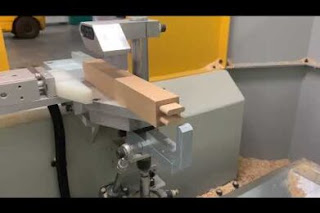Mastering the Art of Joinery with a Woodworking Mortise and Tenon Machine
In the world of woodworking, the mortise and tenon joint stands as a testament to timeless craftsmanship and structural integrity. This traditional joinery method, revered for its strength and simplicity, has been used for centuries in furniture making, timber framing, and various other woodworking projects. With the advent of the woodworking mortise and tenon machine, this age-old technique has been brought into the modern era, allowing for precision and efficiency like never before. Let's explore the wonders of this machine and how it can revolutionize your woodworking projects.
The Essence of Mortise and Tenon Joints
Before
diving into the machinery, it’s essential to understand what mortise and tenon
joints are. A mortise and tenon joint consists of two parts: the mortise, a
rectangular cavity cut into one piece of wood, and the tenon, a corresponding
projection on another piece of wood that fits snugly into the mortise. This
interlocking design ensures a strong, stable connection, making it ideal for
load-bearing structures and furniture that endures significant stress.
The Role of a Mortise and Tenon Machine
A
mortise and tenon machine simplifies and streamlines the process of creating
these joints. Traditionally, woodworking enthusiasts would hand-cut mortises
and tenons using chisels and saws—a method that, while effective, is
time-consuming and requires significant skill. Modern mortise and tenon
machines automate much of this work, delivering precision and uniformity that
is difficult to achieve by hand.
Benefits of Using a Mortise and Tenon Machine
1.
Precision and Consistency: One of the
primary advantages of using a mortise and tenon machine is the precision it
offers. The machine ensures that each mortise and tenon is cut to exact
specifications, providing a perfect fit every time. This consistency is crucial
for projects requiring multiple joints, such as chairs, tables, and frames.
2.
Time Efficiency: Cutting mortises
and tenons by hand can be a labor-intensive process, often taking hours to
achieve just a few joints. A mortise and tenon machine can complete the same
task in a fraction of the time, allowing woodworkers to focus on other aspects
of their projects.
3.
Versatility: Many modern
mortise and tenon machines are equipped with adjustable settings, enabling
woodworkers to create a variety of joint sizes and styles. This versatility
makes the machine suitable for a wide range of projects, from delicate
furniture pieces to robust timber frames.
4.
Ease of Use: While mastering
hand tools requires years of practice, a mortise and tenon machine can be
operated effectively with minimal training. This accessibility opens the door
for hobbyists and novice woodworkers to create professional-quality joints
without the steep learning curve.
Choosing the Right Mortise and Tenon Machine
When
selecting a mortise and tenon machine, consider the scale and nature of your
projects. For smaller, intricate pieces, a benchtop model may suffice, offering
precision without taking up too much space. For larger, more demanding
projects, a floor-standing machine with enhanced capabilities might be
necessary.
In
addition, look for features such as adjustable chisel and drill bits, sturdy
construction, and a user-friendly interface. Investing in a quality machine
will not only improve your woodworking efficiency but also elevate the overall
quality of your projects.
The
woodworking mortise
and tenon machine is a game-changer for both professional woodworkers
and hobbyists. By combining traditional joinery techniques with modern
technology, these machines offer unmatched precision, efficiency, and
versatility. Whether you're crafting a timeless piece of furniture or
constructing a sturdy frame, a mortise and tenon machine can help you achieve
your woodworking goals with ease and excellence. Embrace this blend of
tradition and innovation, and take your craftsmanship to new heights.





Comments
Post a Comment